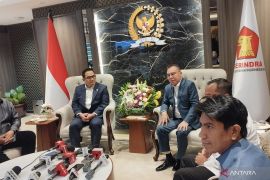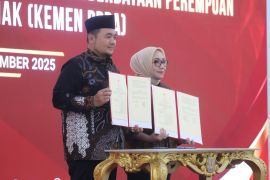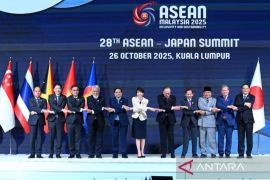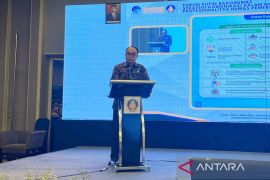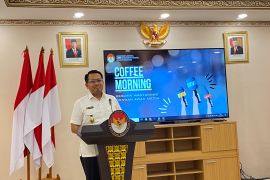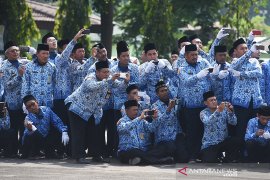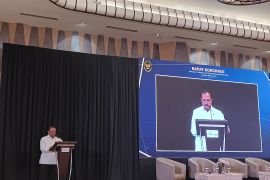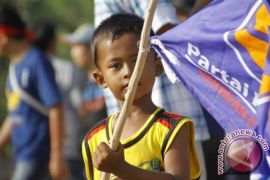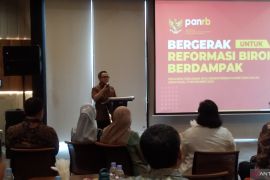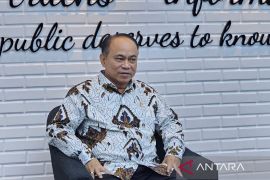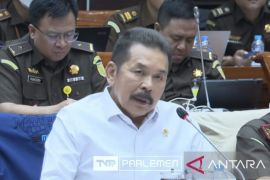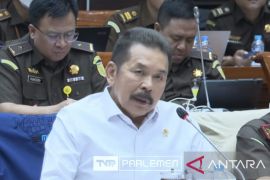Voters living outside Indonesia cast their votes at 828 polling stations through 1,580 mobile voting boxes and 651 postal services, while Indonesian residents exercised their ballot at 820,161 polling stations.
With polling stations in 84 electoral districts in 38 provinces remaining open from 7 a.m. to 1 p.m. local time, many voters had prepared to visit the polling stations in the morning.
Puteri Shafira Nasution said she left home for Polling Station (TPS) 004 in her residential area of Ciomas sub-district, Bogor district, West Java, around 9 a.m.
She went to TPS 004 after watching the live coverage of the three presidential candidates casting their votes in their respective neighborhoods.
"This is my third participation in Indonesia's parliamentary and presidential elections," said the young lady, whose nickname is Putri.
She added that the voting process was peaceful, and since Election Day coincided with Valentine's Day, the TPS 004 working committee's personnel had donned pink T-shirts.
For her, the time it took to register and vote was just 15 minutes. Like other voters, Nasution took five ballot papers from a KPPS officer.
As regulated by the Indonesian voting system, she and other voters were required to punch a hole in the name of their preferred candidate or political party with a nail that the KPPS personnel had prepared in the ballot.
She said she had chosen her preferred presidential and vice presidential pair, as well as candidates for the House of Representatives (DPR), provincial and district/city legislative bodies (DPRD-I and DPRD-II), and Regional Representatives Council (DPD).
"The endeavor has been made, and now it is time to pray for the best outcome," she remarked.
Whoever wins the presidential race is hopefully expected to "bring positive changes for the betterment of Indonesia," she said.
The public, however, will need to be patient to know the legitimate results of Wednesday's elections, as the outcome of the manual vote count will be announced by the General Elections Commission (KPU) by March 20 at the latest.
No doubt, Anies Baswedan-Muhaimin Iskandar, Prabowo Subianto-Gibran Rakabuming Raka, and Ganjar Pranowo-Mahfud MD and their coalitions of political parties are awaiting the moment of truth, too.
In the meantime, several pollsters' quick counts, broadcast on the country's national TV stations, have revealed favorable results for the Prabowo-Gibran pair.
Thus, on Wednesday evening, the candidate pair and their coalition of parties celebrated the quick count results by gathering with their loyalists and supporters at Istora Senayan in Central Jakarta.
After the official result of the KPU's final manual vote count is announced, the winning candidate pair will need to wait for the presidential inauguration, which has been scheduled for October 20.
Great expectations
Voters living abroad and in Indonesia have great expectations of the elected candidate pair working to make Indonesia a developed and prosperous nation.
Indonesia and many other countries are facing several challenges due to global economic instability, ongoing impacts of global warming, wars in Ukraine and Palestine, and rivalry between powerful countries.
According to a senior researcher at the Institute for Development of Economics and Finance (Indef), Riza Annisa Pujarama, resolving rural problems is necessary for Indonesia to create more centers of economic growth.
Responding to the vice presidential debate ahead of Election Day, she said that the problems of villages are not only related to village funds.
One of the major problems is determining how to make Indonesian villages centers of growth by implementing a development model for peripheral regions, she added.
Meanwhile, Muhammad Teguh Ariffaiz Nasution, who is pursuing a postgraduate degree in strategic studies at the Australian National University (ANU), underlined the significance of improving Indonesia's capability to deal with current and future geopolitical trends.
He said that Indonesia's next leader must hopefully be able to take firm steps to respond to the increasingly worrying geopolitical trends that the nation is facing today.
"Our current strategic environment in the Indo-Pacific will be dominated by great power competition between China and the US, with potential flashpoints for open conflict in the Korean Peninsula, Taiwan, the East China Sea, and the South China Sea," he observed.
Among them, a potential conflict over Taiwan and the South China Sea could directly impact Indonesia by disrupting maritime shipping, which would be detrimental to the national economy, or there could be a more serious spillover of the conflict into Indonesian territory, he opined.
Therefore, whoever wins the presidential race will need to commit to strengthening Indonesia's defense capability—not only through purchasing advanced arms from foreign suppliers, but also by investing sufficient funds in the domestic defense industry, Nasution added.
Related news: Elections challenge $106 bln investment target: Minister
Related news: Prabowo-Gibran win big at polling station where Prabowo voted
Editor: Anton Santoso
Copyright © ANTARA 2024

